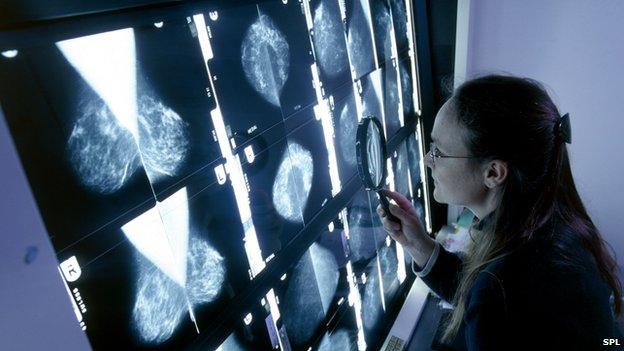Cholesterol 'fuels' breast cancer
- Published

A by-product of cholesterol can fuel the deadly growth and spread of breast cancer, according to a group of scientists.
It raises the prospect that taking cholesterol-lowering drugs called statins could prevent cancer.
The work, published in the journal Science, helps explain why obesity is a major risk factor for the disease.
However, cancer charities cautioned that it was too soon to advise women to take statins.
Obesity has been linked with many cancers including those of the breast, bowel and womb.
The fat in overweight people can pump out hormones, such as oestrogen, which drive the growth of cancers.
A team at Duke University Medical Centre, in the US, showed that cholesterol was having a similar effect.
Cholesterol is broken down by the body into 27HC, which can mimic oestrogen and produce the same effect as the hormone in some tissues.
Experiments on mice showed that a high fat diet increased levels of 27HC in the blood and led to tumours that were 30% larger than in mice on a normal diet.
Tumours were also more likely to spread. And human breast cancer tissue grew more quickly in the laboratory when it was fed 27HC.
One of the researchers Prof Donald McDonnell said: "A lot of studies have shown a connection between obesity and breast cancer, and specifically that elevated cholesterol is associated with breast cancer risk, but no mechanism has been identified.
"What we have now found is a molecule - not cholesterol itself, but an abundant metabolite of cholesterol - called 27HC that mimics the hormone oestrogen and can independently drive the growth of breast cancer."
Treatment
The researchers say their findings raise the prospect that lowering cholesterol can lower the risk of breast cancer developing.
Statins are already taken by millions of people to cut the risk of heart disease. However, studies have already suggested statins can cut the risk of breast cancer, external.
A healthier diet is another way to cut levels of cholesterol in the bloodstream.
Dr Hannah Bridges, from leading charity Breakthrough Breast Cancer, says: "Up until now research into the links between cholesterol levels, use of statins and breast cancer risk has been inconclusive.
"The results from this early study are promising and if confirmed through further research could increase our understanding of what causes some breast cancers to develop."
Dr Emma Smith, from Cancer Research UK, said: "This study is intriguing as it shows for the first time a direct link between cholesterol and breast cancer in mice - but it's too early to say how this knowledge might help tackle breast cancer in the future.
"As things stand, until we know more about the effects of statins on cancer risk, the best ways to cut the risk of developing breast cancer are to stay a healthy weight, cut down on alcohol and keep active."
- Published18 April 2012
- Published18 August 2013
- Published6 November 2012
- Published14 July 2011